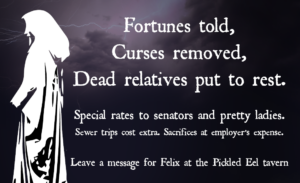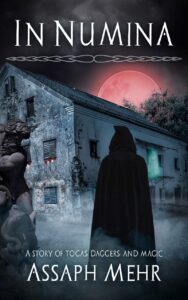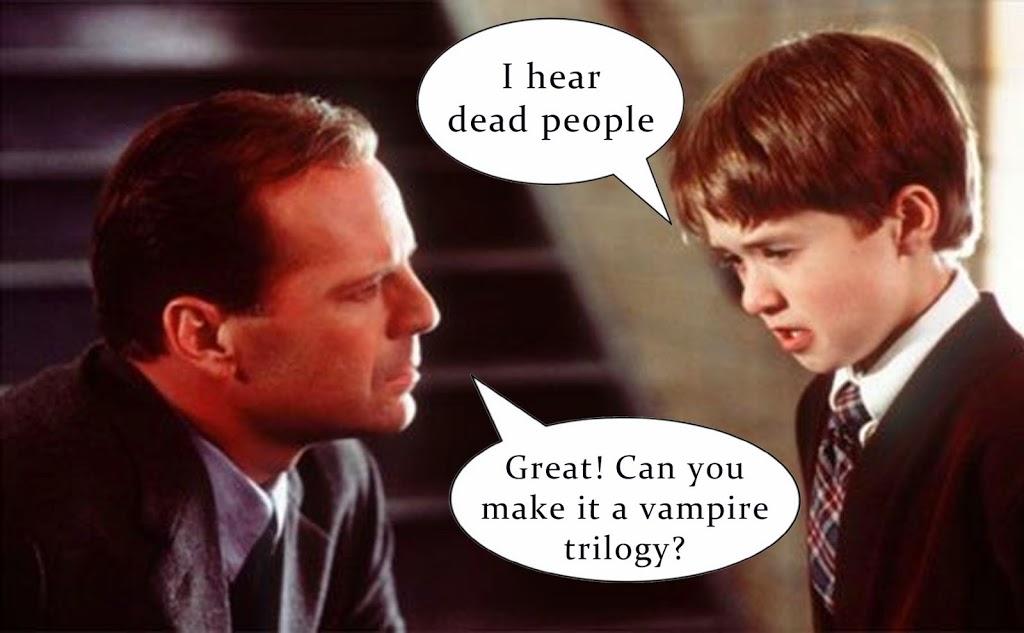
Felix the Fox business card
By Debbie Burke
Recently a writer friend turned me onto a site called The Protagonist Speaks, created by author Assaph Mehr, who was born in Israel and now lives in Australia. He writes a series described as Stories of Togas, Daggers, and Magic for lovers of urban fantasy, detective mysteries, and ancient Rome.
His main character is Felix the Fox, part sleuth, part magician, part fixer who handles occult trouble for Rome’s upstanding citizens who don’t want to dirty their hands.
Felix’s first interview appeared in 2016. The idea of an author interviewing the characters in his book intrigued readers. Soon, Assaph expanded the site to include other authors interviewing their characters.
The concept struck me as a fun, quirky marketing tool. I reached out to Assaph and requested an interview. That is today’s post, although I’m not quite sure who will show up—Assaph or Felix!
Debbie Burke: Please share a little about yourself and your background.
Assaph: I grew up on the shores of the Mediterranean, where every stone has a history – and the stone under it too, going back millennia. One of my favourite spots was an Ottoman citadel (we used to play LARP [live-action role-playing game] there), which is built on Mameluk foundation, laid on top of Roman village, which displaced older settlements to Egyptian times. Can’t grow up like that and not love history. Fantasy I discovered early on when introduced to The Hobbit, and thereafter I’ve been reading it voraciously. I now live in Oz (aka Australia), with various cats, kids, spiders, and water dragons.
Felix: I come from the city of Egretia, which Assaph assures me is very like your own ancient Rome. My father was in the antiquities trade, though I was fortunate enough to be accepted to the Collegium Incantatorum. My father died, the family fortune was lost, and I could no longer pay tuition so never graduated. So, after a brief stint in the legions, I came back and by a stroke of luck apprenticed with a couple of the city’s most renowned investigators. When they didn’t want to take a case that had occult elements, I seized my chance. I combined whatever education in the magical arts I gathered in the collegium with the investigative skills I learnt, and set out to solve paranormal problems for the proletariat.
Assaph: In Ancient Rome tradespeople often advertised by chalking messages on public walls. That’s how I met Felix, and got him to tell me his stories so I could write them down. For our world we couldn’t quite spray graffiti everywhere, so we made Felix some business cards. Please, pass them on to your readers.
DB: Your books sound like an interesting mashup of hard-boiled detective stories, fantasy, and history. How did you come up with that combination?
Assaph: Quite simply, that’s what I always liked to read. I grew up on classic detectives and thrillers, loved ancient Rome, and often escaped into fantasy and Sci-Fi. I always wanted to see my name in print, so when it was time to write I combined my favourite elements into the stories I wanted to read. (sotto voce) Don’t tell Felix he’s a figment of my imagination – he gets offended, and besides I’d rather he not ask uncomfortable questions about some of the misery I put him through.
Felix: For me it was a stroke of luck – my name, Felix, means lucky, so I attribute everything to my patron goddess Fortuna. As everyone will tell you – or, rather, whisper so she can’t hear – she can be a fickle and capricious goddess. I was accepted to the collegium, but had to terminate my studies; with no prospects I joined the legions, but escaped honorably without injury; the two investigators took me in, and I managed to carve out a unique niche for my business. So those stories are just the cases I handle for my customers, which Assaph publishes here. I’m still waiting on those royalties he promised.
Assaph: Skinflint. I told you, I had to pay the editor and the cover designer. We’re waiting on that movie deal for the big payout.
DB: What inspired the seed for The Protagonist Speaks?
Assaph: It was one of those 3 a.m. ideas that stuck. Every reader talks about favourite characters, I thought it would be an interesting idea to let them meet those characters in person, as it were. A bit like a celebrity talk show, but centered about the characters rather than the authors.
DB: How do readers respond to interviews with characters?
Assaph: The responses I get are overwhelmingly positive. Both authors and readers enjoy the quirky experience of letting the character sit on a guest couch and be interviewed. Both authors and readers also tell me that they are sometimes surprised by the answers they get.
Felix: For my part, I can say that it was a bit weird at the start. I didn’t quite get what it was all about, and I was reluctant to share secrets. Now I do have a better understanding of what’s involved, and I can say it can be a phenomenal experience for the character as well.
Assaph: Right, so that’s you agreeing to do another one – proper one – for the next book launch.
DB: What is the site’s primary purpose? Promote author name recognition? A way to increase book sales? Fun and entertainment?
Assaph: Yes – pretty much all of that. Authors and readers get to have a bit of fun, it helps increase exposure of the books to potential readers, and authors end up with long-life marketing collateral, something that can be shared to help increase buzz. Running the site is my way of giving back and helping fellow authors.
DB: Have you experienced an uptick in sales from The Protagonist Speaks?
Assaph: Modest, but yes. As with most marketing, it’s about repeatedly putting good content in front of potential buyers, till they make the decision to buy. Having these quirky interviews helps do just that – it’s a way to come across new authors, it’s a reason to share the books again, it gives more view-points into the author’s style that may help convince a reader that this is a book for them. There is definitely more engagement from authors who understand that, and I see more engagement when authors share it on social media and newsletters (beyond what I normally see when only I share the interviews).
DB: What is the process for an author to submit an interview with a character? Is there any cost?
Assaph: No costs. As said above, it’s my way of helping fellow authors. Heck, I half do it for myself – besides having an excuse to chat up authors I enjoy, I also discovered a few new favourites.
For anyone interested in joining, just fill out the Contact form on TheProtagonistSpeaks.com/Contact.
DB: Anything else you’d like to share with Kill Zone readers?

Assaph Mehr
Assaph: Thanks much for hosting us, Debbie! I promise I’m not as crazy as I sound, despite the voices in my head. Should any of your readers like to meet Felix more, there are a few free short stories and a free novella on my website here: egretia.com/short-stories. Those will give you an idea of the trials and tribulations of a private investigator during antiquity, dealing with the supernatural world (and why he wants to get paid, and I don’t want him to think I’m the cause of all his troubles).
Website: http://egretia.com
Facebook: http://facebook.com/AssaphMehrAuthor
Twitter: @assaphmehr
~~~
As a side note, after chatting with Assaph, I dragged the male lead in my thriller series, Tillman Rosenbaum, kicking and screaming, to Assaph’s interview couch. Please check out Tillman’s reluctant answers on March 5 at The Protagonist Speaks.
~~~
TKZers: Do you ever interview your characters? Do their answers surprise you?
~~~
Debbie Burke’s characters really startled her in her new thriller Flight to Forever. Discover the surprises here.
Cover design by Brian Hoffman



